by Iñaki Mendizabal Elordi.
Who would actually want to extend their working day endlessly? Who is able to consistently challenge the elements and even compete against them? What people would turn the hardest of tasks into a sporting activity, as if wanting to enjoy the same challenge over and over? And, more importantly, why?
Basques have been doing this for centuries, since the origins of Basque Rural Sports (in Basque, Herri Kirolak) and its various modalities date back to the middle ages and, in some cases, to prehistoric times. All of these sports have their origins in rural work activities which, over time, have become athletic exercises, sometimes driven by the simple challenge and others by another powerful incentive that has kept these disciplines alive through recent centuries: betting.
Thus, the various forms of Basque Rural Sports form an old map and true to the ways of life of the inhabitants of Euskal Herria (the Basque Country), whose crafts and daily chores are reflected with authenticity and rare doses of intensity in these local sports. Tasks like building farmhouses and huts with stone, felling trees, manufacturing coal, working the land with oxen, gathering harvest and transporting it, dragging boats from the shore, mowing grass and haying have inspired these many types of sport that mimic the dynamics of these chores, but for sure, multiplying the effort involved.
Driven by their competitive zeal, the Basques have mimicked more than twenty tasks, turning them into regulated sports (of these only 18 have been recognized by the Basque Government as ‘Basque Rural Sports’). Some of these sports are specific to the Basque Country and others are practiced in one form or another in various parts of the world such as sega jokoa (scything), which extends through several European countries, aizkora proba (wood chopping), which is very popular in places like Canada, New Zealand and Australia, or soka tira (tug-of-war), a sport that has its own International Federation (TWIF) with more than 70 affiliated countries.
Currently, the modalities considered Basque Rural Sports (Herri Kirolak) by the Basque Government are as follows:
–Aizkora proba (wood chopping): consists of chopping through a number of trunks; the one who finishes first wins, but there are also other types of contests.
–Giza-abere proba (dragging contests): Giza probak (with humans); Zaldi probak (with horses); Idi probak (with oxen); Asto probak (with donkeys). In these contests the animals or people drag stones of various sizes in a particular place called probaleku.
–Harri jasotzea (stone lifting): This is a variant of weight lifting and consists of hoisting stones of different sizes and shapes to the shoulder.
–Harri zulaketa (hole drilling): This consists of drilling through blocks of stone using strokes and rotation with a metal bar called an auger. This also comes from traditional tasks, but with origin in mining rather than agriculture. At one time, sticks of dynamite were placed in the holes drilled into the rock to blow it up.
–Ingude altxatzea (anvil lifting): This consists of raising an 18 kg iron anvil from its resting position to a certain height the greatest number of times.
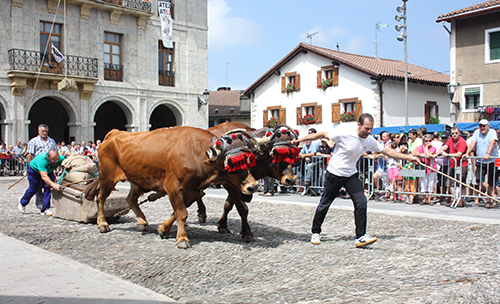
–Lasto altxatzea (bale lifting): Here the object of the contest is raising a bale of hay the greatest number of times to a determined height with the help of a pulley.
–Lasto botatzea (bale tossing): This consists of tossing a bale of straw above a horizontal bar with the help of a pitchfork.
–Lokotx biltzea (cob gathering): The object is to gather into a basket in the shortest time possible 60 cobs of corn which are placed in a row 1.25 meters away from one another.
–Orga jokoa (cart game): This contest consists of lifting a wagon and circling it around an axis point; the distance is calculated on the circumference and the cart can weigh between 250 and 350 kg.
–Sega jokoa (scything): Here the object is to cut the biggest amount of grass, using a scythe in a meadow in a given area and for a predetermined time. Athletes are called segalaris. This sport is also practiced outside of the Basque Country in the region of Switzerland, Germany, Austria, Slovenia and the Balkans.
–Soka tira (tug-of-war): Although this is considered a rural sport in the Basque Country, it is a widespread sport with its own Federation and international competitions. It was an Olympic sport in the first Olympics of the Modern Era (1900-1920).
–Trontza (sawing): This contest consists of sawing trunks of certain sizes in the shortest time possible using a saw.
–Txinga eramatea (weight carrying): This consists of carrying two weights as far as possible, one in each hand, without a time limitation. Each dumbbell weighs 25 kilos, although there have been contests performed with txingas weighing 50 kilos each.
–Ontzi eramatea (churn carrying): This is a variant of the above which replaces the weights with milk churns or barrels.
–Zaku eramatea (sack carrying): These are races that are carried out with a bag of 80 kilos carried on ones back. They emulate the work of smugglers and originate on the border area between Spain and France.
UNCERTAIN FUTURE
There are two striking traits of Basque rural sports, specific characteristics that differentiate it from similar sports that are practiced in other parts of the world: the first, great physical strength and endurance, and this intensity also marks the character of the people of the rural Basque Country, tanned by their tough daily routine. In this way, and for centuries, the Basques have consecrated work and, to some extent, their work has forged their character and the way of being of Basques.
In addition to effort and sacrifice, the second peculiarity that characterizes Basque rural sports is the wager, the ancestral desire to see who is better, stronger, or faster. With Basque agriculture, the wager came from the work itself and instead of resting, the baserritarra (farmer) spent down-time imitating these same tasks in public squares, with spectators and in tough competition with fellow farmers. The occurrence of two deaths in the last few decades, give testimony to the intensity of the competition then (and still present). Fortunately, the various federations of Herri kirolak, created in the 1980s, and regulations that have derived from them, now facilitate the practice of these sports and prevent serious accidents from taking place.
In addition, Rural sporting is considered a strategic sport by the Basque Government, which helps protect it and ensures some economic support. Aside from the institutional support of the Basque Government and the various provincial councils, in recent years some of these exercises have been implemented in after-school classes in public and private schools as games.
Still, the situation of the various modalities is far from thriving. The practice of Basque rural sports has dwindled as the rural world has declined to the push of big cities. Competition from other sports with a more playful tone does not help vitalize these old disciplines, currently in a vulnerable spot, even though modalities like Aizkora proba (wood chopping) or Sega jokoa (scything) have a remarkable number of practitioners. Right now, the survival of these ancient sports is hanging by a thread.
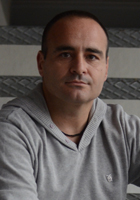 |
Iñaki Mendizabal Elordi is a journalist. |
| inakimendizabal@gmail.com | |



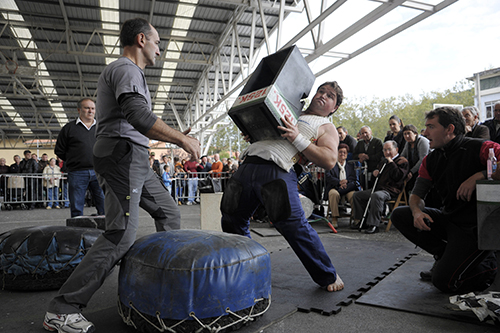


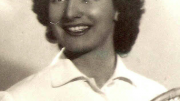
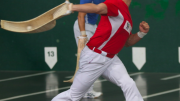

Be the first to comment on "Basque Rural Sports: Where Effort is the Key"